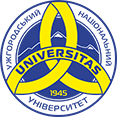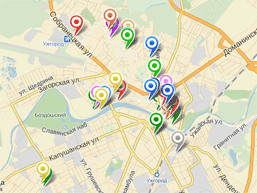Faculty of Chemistry
The Faculty of Chemistry was established in 1946. Since that time there have been trained almost 4000 chemists and more than 300 ecologists, who work in various fields of the national economy, science and education.
The faculty carries out the training of specialists in the field of knowledge 0401 "Natural Sciences":
- Direction 6.040101 – Chemistry at the educational qualification levels of "Bachelor" and "Specialist" of specialty 7.04010101 - "Chemistry", "Master" of specialty 8.04010101 - "Chemistry".
- Direction 6.040106 - "Ecology, Environmental Protection and Well-Balanced Management of Nature" at the educational qualification levels of "Bachelor" and "Specialist" of specialty 7.04010601 - "Ecology and Environmental Protection", "Master" of specialty 8.04010601 - "Ecology and Environmental Protection".
Five departments provide the training of chemists and ecologists:
- Inorganic chemistry,
- Analytical chemistry,
- Organic chemistry,
- Physical and colloid chemistry,
- Ecology and environmental protection.
The faculty provides educational courses at the faculties of chemistry, medicine, dentistry, geography, biology, physics, mathematics, engineering as well as at the Institute of postgraduate education and hold preparatory courses. The academic process is provided by 10 professors, 25 associate professors, 1 senior lecturer and 56 assistant workers. More than 30 faculty graduates received the degree of Doctor of Chemical Science and over 130 – Candidate of Chemical Science.
At the students' disposal there is a computer class, equipped with state-of-the-art computers.
The special feature of education at the faculty is grouping the 3rd year students according to 4 specialties: inorganic, analytical, organic, physical and colloid chemistry. For each specialty there are 4-6 different special courses, practical and laboratory classes in well-equipped chemical laboratories.
The students, specializing at the department of inorganic chemistry, have the following special courses:
- Nanochemistry and methods of nanotechnology
- Chemistry of solids
- Technology of electronic technique materials
- Symmetry and crystal properties.
The students, specializing at the department of analytical chemistry, have the following special courses:
- Organic reagents in analytical chemistry
- Methods of division and concentration in analytical chemistry
- Optical methods of the analysis
- Analytical chemistry of environment
- Theoretical basics of analytical chemistry.
The students, specializing at the department of organic chemistry, have the following special courses:
- Mechanisms of organic reactions
- Physico-chemical research methods of organic compositions
- Chemistry of heterocyclic compounds
- Organic analysis
The following special courses are delivered at the department of physical and colloid chemistry:
- Chemical thermodynamics
- Chemical kinetics
- Catalysis
- Catalysis in industry
- Absorption and adsorbents.
The ecologists have the following courses provided by the department of ecology and environmental protection – Modelling and forecasting of environmental conditions, Urbaecology, Environmental monitoring, Technoecology, Rating of environmental pollution.
The students consolidate obtained theoretical knowledge during educational, pedagogical and industrial practices. The outcomes of their research are presented in year papers, degree theses and scientific articles.
After 4 academic years students receive university degrees of the Bachelor of Chemistry and the Bachelor of Ecology. Those, who obtained the Bachelor’s degree with distinction, continue their studies in the magistracy. Having completed the full course of education, the faculty graduates receive the Specialist’s degree with the qualification «Chemist. Teacher» as well as the Master’s degree with the qualification «Master of Chemistry. Teacher» at the specialty «Chemistry»; the Specialist’s degree with the qualification «Environment specialist. Teacher» as well as the Master’s degree with the qualification «Master of Ecology. Teacher» at the specialty «Ecology and Environmental Protection».
Each department has clearly-cut scientific subjects.
The department of inorganic chemistry – the Head of the department is I. E. Barchiy, Doctor of Chemical Science, Professor, Member of the Coordination Council on issues of Inorganic chemistry to NAS of Ukraine. The department is working in the direction of elaborating theoretical bases for synthesis and cultivation of monocrystals of complex semi-conducting compositions, the research of their physico-chemical properties, which enables the opportunity to obtain new materials for the needs of solid-state electronics, the making of ionoselective electrodes. The research is being conducted for obtaining and investigating high-temperature superconductive ceramics. For weighty achievements the author group of E. Yu. Peresh, Yu. V. Voroshylov, M. I. Hurzan, I. D. Oleksiyuk, M. I. Holovey was awarded the State prize in the field of science and technology in 2000 for the scientific work «Chemistry, technology and properties of complex chalcogenide halogen materials».
The department of analytical chemistry – the Head of the department is Ya. R. Basel, Doctor of Chemical Science, Professor, Member of the Scientific Council of NAS of Ukraine on issues «Analytical Chemistry», Chief of its Western section, «High achiever in education of Ukraine», Honoured inventor of Ukraine.
The scientific subjects are the metal complexing with electronegative ligands and organic bases as well as analytical application of generated compositions. The department became the methodical centre on issues of implementing innovative methods of analysis in various factory and research chemical laboratories of the Transcarpathian region. The department staff conducted a series of fundamental researches in the theory of generation and extraction of ionic associative with essential dyes; formulated its fundamental provisions, which may be used on choosing conditions for determining different elements. The research is being conducted on producing optical and electrochemical sensors for determining different inorganic and organic agents.
The department of organic chemistry – the Head of the department is V. H. Lendyel, Doctor of Chemical Science, Professor, Dean of the Faculty of Chemistry, «High achiever in education of Ukraine», Honoured educator of Ukraine, Member of an Academy UTA.
The department is working at the investigation of heterocyclic reaction of unsaturated compositions, which develop biological activity and semi-conductor properties. The scholars of the department are working at regional subjects: «Timber mill sewage purification of organic agents», «Production technology improvement of abrasive tools at Irshava abrasive factory».
The department of physical and colloid chemistry – the Head of the department is N. P. Holub, Candidate of Chemical Science, Associate Professor, the Deputy Dean of the Faculty of Chemistry, «High achiever in education of Ukraine».
At the department there are conducted researches on studying the mechanism and kinetics of the processes of selective methane and its components oxidation as well as elaborating natural sorbents application ways for the purification of environmental objects: atmosphere, mineral water and sewage, soil and living organisms from dangerous pollutants (radionuclides, heavy metals etc.). In scientific laboratories of the department under the supervision of experienced scholars students carry out research work on the development of new effective and highly selective catalysts and sorbents for various industries and environmental protection.
The department of ecology and environmental protection - the Head of the department is S. Yu. Chundak, Doctor of Chemical Science, Professor, «High achiever in education of Ukraine», Member of the Coordination Council on issues «Inorganic chemistry» to NAS of Ukraine. The department is involved in the scientific research under the principal subjects: «Elaboration of theoretical and practical methods of technological processes and environmental objects monitoring». The scientific efforts of the department are aimed at conducting applied investigations according to the directions:
- Elaboration of methods for environmental objects monitoring. Assessment of environmental objects ecological conditions as well as estimation of man-made burden.
- Elaboration of ecologically-friendly technology for industrial waste utilization, comprehensive raw materials use.
- Modelling and forecasting of environmental condition.
The graduates of the faculty work as teachers at schools, technical colleges; engineers at plants. Those students, who showed inclinations and aptitude for scientific work, continue their postgraduate study, available at each department.
We are glad to welcome in our staff everyone, who is not afraid of difficulties, fond of untiring work and willing to dedicate their lives to exciting and very important industries of modern science – chemistry and ecology.
L.Sidun
04.12.14










